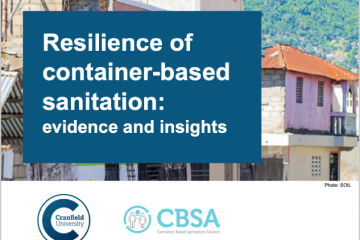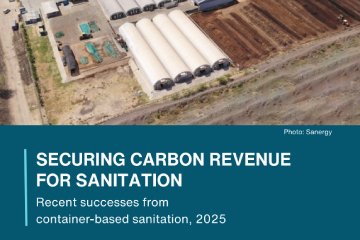Following the collective efforts of WASH partners, the importance of climate-resilient sanitation has been recognised in high-level efforts to address the climate crisis, with an explicit mention in the Global Goal on Adaptation (GGA) water thematic target.
The GGA is a global commitment aiming to enhance adaptation capacity, strengthen resilience, and reduce vulnerability to climate change. It was established as an effort to raise ambitions for adaptation. The next steps will include developing a framework through which countries and the United Nations Framework Convention on Climate Change (UNFCCC) will conduct the monitoring, evaluation and learning (MEL) of adaptation under the Paris Agreement.
The first thematic target of the GGA framework is dedicated to water and sanitation. Significantly, climate-resilient sanitation has been explicitly included in the commitment and not subsumed within water, where it is easily side-lined. Its inclusion paves the way for better integration of sanitation in climate policy and practice.
This is important progress, but there is still a long way to go. Partners are committed to keeping up the momentum to ensure that high-level commitments are turned into tangible actions towards achieving the ultimate goal of providing access to sanitation, safeguarding communities, protecting ecosystems and reducing the impact of sanitation on the climate crisis. Next steps include:
Defining climate resilient sanitation
Increasing the profile of sanitation within the high-level climate process has been a key focus of WASH sector partners including the Climate Resilient Sanitation (CRS) Coalition and the Sanitation and Water for All (SWA) Climate Task Team. The groups are now collaborating on the next steps, including developing a formal definition of climate resilient sanitation as part of a wider definition of climate resilient WASH.
Calling for sanitation as a key topic in the mitigation program
The CRS Coalition is also calling for sanitation to be included as a key topic for discussion within a 2023-24 program on mitigation. Poorly managed on-site sanitation systems are estimated to contribute about 5% of anthropogenic methane, which has approximately a 0.04 C climate forcing effect, but lack of linkages between sanitation and climate emission pledges and plans is preventing action on this crucial area. There is minimal inclusion of sanitation in climate policy and financing, including in countries’ Nationally Determined Contributions (NDC) climate pledges and National Adaptation Plans (NAPs).
Green Climate Fund sanitation annexe
The conference also saw progress in efforts to unlock climate financing for sanitation. Of the $5 billion allocated to approved projects by the Green Climate Fund (GCF), by April 2019 only $1.24 million was directed towards sanitation In a workshop, the GCF and the CRS Coalition discussed a concept and outline of a specific annexe on sanitation within the GCF Water Security Sectoral Guide, which will include practical guidance on how those applying for climate funds can design climate-resilient sanitation projects.
Read more:
The first thematic target of the GGA framework is dedicated to water and sanitation
COP28: Did world leaders finally connect the drops on WASH and climate adaptation?
About the CRS Coalition
Building on a joint Call to Action launched at COP27 in 2022, the Climate Resilient Sanitation Coalition aims to integrate sanitation into climate policy and practice, and climate adaptation and mitigation into sanitation policy and practice. It is a growing coalition of international organisations, research organisations and practitioners working collectively towards improved prioritisation, capacity and investment in climate resilient sanitation.
The CRS Coalition calls for a narrative shift; instead of seeing sanitation as a climate problem, we must all see increased and sustained investment in climate-resilient sanitation as a climate solution – because it is! It is a solution that has the power to both reduce emissions and increase the health, well-being and resilience of communities and the ecosystems on which we all depend.
CRS Coalition calls to action:
- Read our Sanitation Call to Action.
- Include climate resilience in sanitation policies, plans, budgets and services and increase political commitments, particularly to the poorest and most climate-affected communities.
- Incorporate climate-resilient sanitation into National Adaptation Plans, National Biodiversity Strategies and Action Plans, and Nationally Determined Contributions and strengthen the climate rationale for investment.
- Strengthen government systems and capacities to provide climate-resilient sanitation services.
- Invest in and improve the evidence base for effective adaptation and emissions reduction in climate-resilient sanitation.
- Develop and implement affordable, innovative, climate-resilient sanitation technologies and service models.
Find out more about the importance of climate-resilient sanitation and the work of the CRS Coalition.


